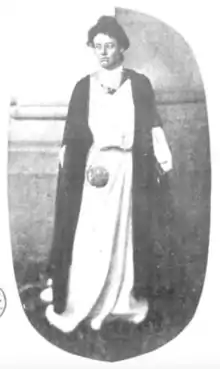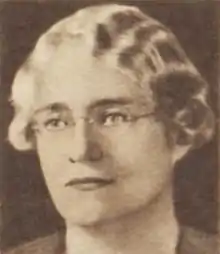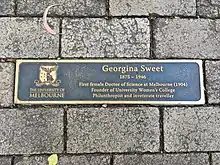Georgina Sweet
Georgina Sweet OBE (22 January 1875 – 1 January 1946) was an Australian zoologist and women's rights activist. She was the first woman to graduate with a Doctor of Science from the University of Melbourne, and was the first female acting professor in an Australian university.

Georgina Sweet OBE | |
|---|---|
 1937 photograph by Spencer Shier | |
| Born | 22 January 1875 Brunswick, Victoria, Australia |
| Died | 1 January 1946 (aged 70) |
| Occupation | zoologist |
| Known for | parasitologist |
Early life and education
Sweet was born into a Methodist family in Brunswick, Victoria; her English father George Sweet was an amateur geologist and encouraged both his daughters to enter tertiary education.[1] Sweet attended the Parkville Ladies' College, then went on to the University of Melbourne where she completed her BSc in 1896 and her MSc in 1898. Her early research was supervised by Baldwin Spencer and was on Australian fauna, but her later studies were based in the veterinary department working on parasites. She was awarded her DSc in 1904 for her study of Notoryctes – the marsupial mole; she was the first woman to take out a Doctor of Science at the University.[1] Her work on parasites in Australian native animals and stock led to the award of the David Syme Research Prize in 1911, she was the first female recipient of the prize and she received a reputation as Australia's foremost parasitologist.[1]
University career
Sweet taught biology in high schools while studying; she was employed by the University from 1898 when she began work as a demonstrator, she lectured at Queen's College from 1901 to 1908 until she was offered a position in the university faculty. She lectured in both biology and parasitology and bore a heavy workload due to the periodic absence of the faculties professors.[1] She became second-in-charge of the biology school when Thomas Sergeant Hall died in 1915, and from November 1916 to March 1917 she was Australia's first female acting professor when Baldwin Spencer took leave.[2] She was encouraged to apply to take his position permanently, but was not successful, with the position going to W. E. Agar. She was promoted to associate professor in 1920 and was the first woman to hold such a senior academic position at the university; however due to stress and over-work she had to apply for sick leave in 1921, she worked part-time from 1924 and retired in 1926.
After leaving teaching Sweet continued to be involved in university life. She was active in the Graduates' Association and was involved in the provisional council for the establishment of the University Women's College for 20 years. The first stone of the Georgina Sweet wing was laid in 1936 and in the following year the first nondenominational hall of residence affiliated with the University opened.[3] In 1936 she was the first woman elected to the University Council.
Women's rights advocate
Sweet was a vigorous supporter of women's rights. She campaigned to have women on the University Senate and outside university her interests involved participation in national and international bodies promoting women's rights. Sweet was Australian president of the Young Women's Christian Association, 1927–1934; vice-president of the world YWCA from 1934; she was also foundation member of the Victorian Women Graduates' Association and in 1930 became the first president of the Pan-Pacific Women's Association.[4]
Sweet enjoyed travel and made a journey overland from Cape Town to Cairo with Australian historian Jessie Stobo Watson Webb in 1922. She also travelled widely in Asia. When she died in 1946 she willed her estate to the Methodist church, the University and other charitable organisations.[1] Some of her bequest to the University was used to establish the Georgina Sweet Bursary, which provides funds to a student of sufficient academic merit who is in special need of financial assistance.[5]
Awards and honours

Sweet was appointed Officer of The Order of the British Empire on 3 June 1935, for services to women's movements.[7][1] The Australian Federation of University Women offers an annual scholarship for Australian women undertaking postgraduate studies named in her honour.
Sweet was awarded the University of Melbourne Award, which "recognises those individuals who have made an outstanding and enduring contribution to the University and its scholarly community". A bronze plaque honouring her is on the wall along the Professors' Walk at the Parkville campus of the University.[6][8]
In 2010 the Australian Research Council named an award, the Kathleen Fitzpatrick and Georgina Sweet fellowship after Sweet for women researchers in science and technology disciplines.[9]
Sweet Place in the Canberra suburb of Chisholm is named in her honour.[10]
References
- Monica MacCallum, Sweet, Georgina (1875 - 1946), Australian Dictionary of Biography, Volume 12, Melbourne University Press, 1990, pp 149–150.
- "DOCTOR OF SCIENCE". The Herald (12, 592). Victoria, Australia. 10 October 1916. p. 4. Retrieved 2 October 2020 – via National Library of Australia.
- A Sweet example Archived 28 September 2007 at the Wayback Machine, WiseNet Issue 50, 1999
- Sweet, Georgina (1875 – 1946), The University of Melbourne eScholarship Research Centre, 1994 - 2007
- University of Melbourne. R6.72 - Commemorative Scholarships and Awards Archived 29 August 2007 at the Wayback Machine
- "University Awards". University of Melbourne Awards: Our History. Retrieved 17 September 2020.
- It's an Honour
- University of Melbourne (2017). "2017 Recipients of the University of Melbourne Award" (PDF): 9-10. Cite journal requires
|journal=(help) - Council, Australian Research (12 June 2018). "Kathleen Fitzpatrick and Georgina Sweet Australian Laureate Fellows". www.arc.gov.au. Retrieved 10 December 2018.
- "Schedule 'B' National Memorials Ordinance 1928–1972 Street Nomenclature List of Additional Names with Reference to Origin: Commonwealth of Australia Gazette. Special (National: 1977–2012) – 8 Feb 1978". Trove. p. 14. Retrieved 2 April 2020.
External links
- Works by or about Georgina Sweet in libraries (WorldCat catalog)
- Sweet, Georgina in The Encyclopedia of Women and Leadership in Twentieth-Century Australia